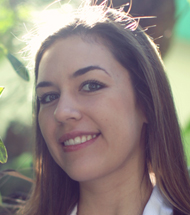"Guatemala has two poles, that of child malnutrition and the obesity epidemic in adults."
Lucía Gutiérrez Spillari (E-MENU 12) is academic coordinator of Nutrition at the University of Guatemala.

PHOTO: Courtesy
After completing the Master's Degree E-MENU, Lucía Gutiérrez Spillari has returned to her country to work as academic coordinator of the degree program in Nutrition at the Francisco Marroquín University in Guatemala. According to her, the Master's Degree E-MENU has taught her to seek answers to problems through accurate sources: "I learned the importance of searching for and critically evaluating scientific information. Both actions are very valuable when it comes to directing the academic part of a nutrition program," he explains.
Regarding the role of research in her country, Lucía considers that science is the future of any territory: "Guatemala has very different problems from those of Spain, which we must investigate in order to find solutions. What I would most like to do would be to replicate the quality of Pamplona's research in Guatemala, starting from a line of work as clear as the one I knew and experienced during my time at the University of Navarra".
Regarding the peculiarities of the Central American country, this postgraduate in Nutrition and Metabolism points out that Guatemala has two poles, "on the one hand, we have high child malnutrition, and at the same time we are having an epidemic of obesity in adults, which is aggravated by the influence of our neighbors: Mexico and the U.S. Our children reach a small stature due to intrauterine growth restrictions which, at the same time, makes them more prone to suffer from metabolic syndrome in adulthood. In addition, the fees of chronic kidney disease and diabetes are very high, which confirms the urgent need for global solutions to reduce these figures in the general population," warns the expert.
After her experience in the Master's Degree E-MENU of the School of Pharmacy and Nutrition, Lucía is clear about the competitive advantages that the postgraduate program has given her: "It has given me tools that I can apply in any area of Nutrition, from the industry to the clinic, that is why I encourage all those students who want to solve a nutritional problem in their community or country to study this Master's Degree ", she concludes.





